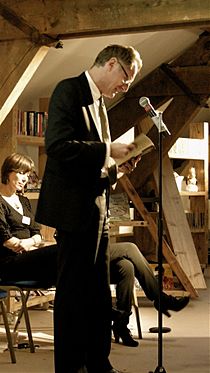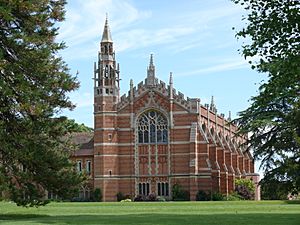Andrew Motion facts for kids
Quick facts for kids
Andrew Motion
FRSL
|
|
|---|---|

Motion reading poetry in 2009
|
|
| Poet Laureate of the United Kingdom | |
| In office 1 May 1999 – 1 May 2009 |
|
| Monarch | Elizabeth II |
| Preceded by | Ted Hughes |
| Succeeded by | Carol Ann Duffy |
| Personal details | |
| Born | 26 October 1952 London, England |
| Spouses |
|
| Children | 3 |
| Education | Radley College |
| Alma mater | University College, Oxford |
| Occupation | Poet |
Sir Andrew Peter Motion (born 26 October 1952) is a famous English poet, writer, and biographer. He held a special job called Poet Laureate for the United Kingdom from 1999 to 2009. This role means he was the official poet for the country.
During his time as Poet Laureate, Andrew Motion started the Poetry Archive. This is an amazing online collection where you can find poems and listen to poets read their own work. In 2012, he also became the President of the Campaign to Protect Rural England. This group works to protect the beautiful countryside in England.
Contents
Early Life and Education
Andrew Motion was born in London, England, on October 26, 1952. His father, Richard Motion, worked in brewing. His mother was Catherine Gillian Bakewell. The family lived in different places when he was young, including Kimpton, Hertfordshire and Hatfield Heath.
Andrew went to primary school in Much Hadham. When he was seven, he started attending a boarding school called Maidwell Hall. His younger brother also joined him there.
Discovering Poetry
When Andrew was twelve, his family moved to Stisted in Essex. He spent a lot of time alone there, exploring the countryside with his dog. This helped him develop a love for nature.
Later, he went to Radley College. There, a wonderful English teacher named Peter Way introduced him to poetry. He learned about famous poets like Thomas Hardy, Philip Larkin, and John Keats.
Family Challenges and University
When Andrew was seventeen, his mother had a serious horse-riding accident. She suffered a bad head injury and was very ill for nine years before she passed away in 1978. Andrew has said that writing helped him keep his mother's memory alive.
Around age 18, he left Stisted to study English at University College, Oxford. He was taught by the famous poet W. H. Auden. Andrew did very well, earning a top degree. He then continued his studies, focusing on the poetry of Edward Thomas.
Career Highlights
From 1976 to 1980, Andrew Motion taught English at the University of Hull. While there, at age 24, he published his first book of poems called Inland. He also met Philip Larkin, another poet he admired, who worked as the university's librarian.
After Larkin's death, Andrew Motion became one of the people in charge of his writings. He later wrote a book about Larkin's life, Philip Larkin: A Writer's Life, which won an award in 1994. This book helped save many of Larkin's important papers.
Andrew Motion also worked as an editor for a publishing company and edited a poetry magazine. He taught creative writing at the University of East Anglia and now teaches at the Johns Hopkins Writing Seminars.
Serving as Poet Laureate
Andrew Motion became the Poet Laureate on May 1, 1999. He took over from the previous laureate, Ted Hughes. Unlike past laureates who held the job for life, Andrew decided he would only stay for ten years.
He wanted to write poems about current events and everyday life. He wrote about important topics like homelessness, bullying, and even the foot and mouth disease outbreak. He also wrote about sad events like the Paddington rail disaster and the 11 September attacks.
Special Poems and Projects
In 2002, Andrew Motion helped unveil a special plaque in London. It honored poets John Keats and Henry Stephens, who once lived there.
He wrote a poem called Regime change in 2003, which was a protest against the Invasion of Iraq. In 2005, he wrote Spring Wedding for the wedding of Prince Charles and Camilla Parker Bowles. He also wrote a series of poems for Harry Patch, the last surviving British soldier from the First World War.
As Poet Laureate, he created the Poetry Archive. This online library has recordings of poets reading their own work. It's a great way to hear poems directly from the people who wrote them.
Andrew Motion found some parts of the job challenging. He felt it sometimes made it hard for him to do his own writing. However, he was glad he took on the role and felt it was very rewarding. He finished his term as Poet Laureate on May 1, 2009, and Carol Ann Duffy took over.
After the Laureateship
After his time as Poet Laureate, Andrew Motion continued to be very active. He became the chairman of the Arts Council of England's literature panel. He is also a Fellow of the Royal Society of Literature.
In 2003, he became a professor of creative writing at Royal Holloway, University of London. He was also knighted in 2009, which means he received the title "Sir."
New Projects and Recognition
In 2010, Andrew Motion was chosen to lead the judging panel for the Man Booker Prize, a major book award. He also announced he was writing a sequel to the famous book Treasure Island, called Silver, which was published in 2012.
He returned to Kingston-upon-Hull for a literature festival and helped name a bus after Philip Larkin. In 2011, his play Incoming, about the war in Afghanistan, was performed. He also appeared on a TV show called Jamie's Dream School as a poetry teacher.
In 2012, he became the President of the Campaign to Protect Rural England. In 2015, he won the Ted Hughes Award for a radio program called Coming Home. This program featured his poetry based on recordings of British soldiers returning from wars.
In 2017, Andrew Motion moved to Baltimore, Maryland, to teach at Johns Hopkins University.
His Work and Style
Andrew Motion has said that he writes poems to understand things better himself. His poetry often combines storytelling with beautiful language. He tries to write in a clear way that is easy to understand.
The Independent newspaper has called him a "charming and tireless defender of the art form" of poetry. He has won several awards for his writing, including the Arvon Prize and the Dylan Thomas Prize.
Personal Life
Andrew Motion has been married three times. His first marriage to Joanna Powell ended in 1983. He was married to Jan Dalley from 1985 to 2009. They had three children together: a son born in 1986, and twins (a son and a daughter) born in 1988. In 2010, he married Kyeong-Soo Kim.
He spends part of the year living in Baltimore.
Selected Awards and Honors
- 1975: Won the Newdigate prize for Oxford undergraduate poetry
- 1976: Eric Gregory Award
- 1981: Won the Arvon Foundation's International Poetry Competition
- 1984: John Llewellyn Rhys Prize for Dangerous Play: Poems 1974–1984
- 1987: Somerset Maugham Award for The Lamberts
- 1987: Dylan Thomas Prize for Natural Causes
- 1994: Whitbread Prize for Biography for Philip Larkin: A Writer’s Life
- 1999: Appointed Poet Laureate
- 2009: Knighted (became Sir Andrew Motion)
- 2014: Wilfred Owen Poetry Award
See also
 In Spanish: Andrew Motion para niños
In Spanish: Andrew Motion para niños
 | Stephanie Wilson |
 | Charles Bolden |
 | Ronald McNair |
 | Frederick D. Gregory |


